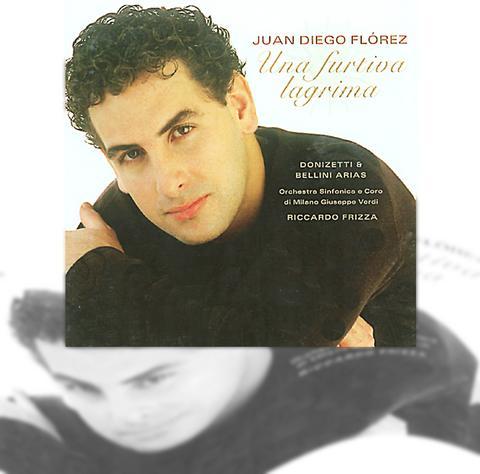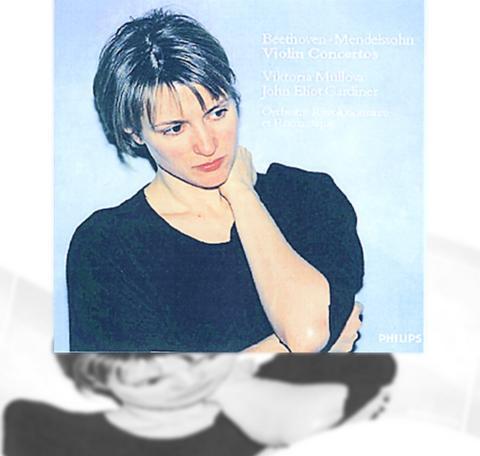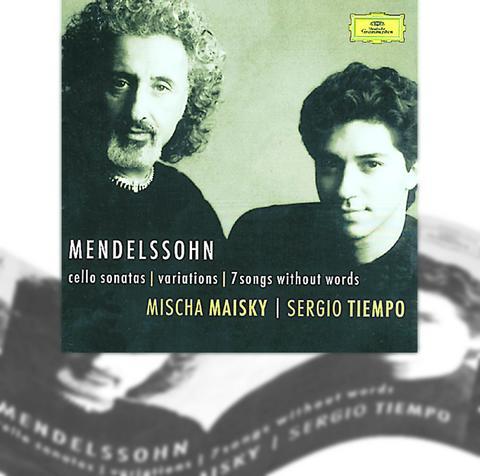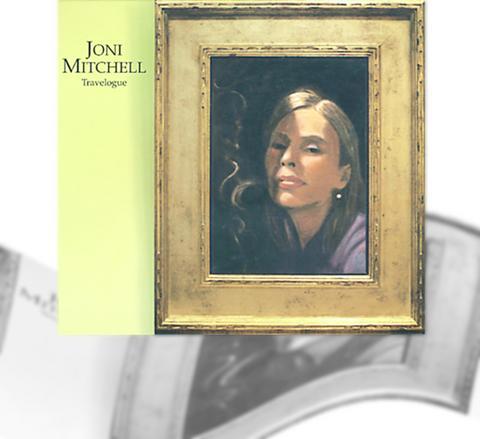JUAN DIEGO FLOREZ

Una Furtiva Lagrima

Donizetti & Bellini Arias

Orchestra Sinfonica di Milano Giuseppe Verdi, cond. Frizza Decca 473 440-2

It's rather unusual for tenors to record selections from "bel canto" operas -- it's something more often left to sopranos. The florid yet smoothly-flowing vocal writing that characterized this early 19th century style favored women, especially when their characters were deranged by being abandoned in love and were given arias of staggering versatility to express the extremity of their emotion. The Romantics were in love with madness. The sanity of the rational mind didn't know the half of it, they believed.
Perhaps the insane had access to a higher wisdom that the rest of us could aspire to, a point of view readily adopted by today's drug-fueled youth cultures.
The Peruvian tenor Juan Diego Florez, still only 30, has a very alluring voice. It's light, romantic, and thrilling at the top of his register. He specializes in Donizetti, Rossini and Bellini roles, and says he hasn't even had to consider singing in the more heroic, powerful style normally required by Verdi (though he specializes in singing Fenton in Falstaff).
"Bel canto" is now back in operatic fashion, and Juan Diego Florez is the man to fit the moment.
Also striking on this fine CD is the strong showing by brass instruments.
The Milan orchestra's trumpets blare brilliantly and its trombones mourn woefully. The recording is also available in SACD format.
VIKTORIA MULLOVA
Beethoven & Mendelssohn Violin Concertos
Orchestre Revolutionaire et Romantique, cond. Gardiner
Philips 473 872-2
John Eliot Gardiner has long been associated with "authentic" versions of classic orchestral works, ie, ones using period instruments of the kind audiences would have heard when the music was first performed. Here he is back at it again, this time with an orchestra devoted to music from the time of the French Revolution and the decades following (as its title shows).
This, of course, was Beethoven's era as well, but his works, so many of which aspire to stormy thunder-claps, were the first to benefit from larger orchestras and metal strings for violins, introduced to increase volume and supposed impressiveness. It's particularly interesting, then, to have the great insister's violin concerto given this authentic treatment. It benefits hugely. Nowadays, in a time of electronic amplification on every hand, no one is much impressed by acoustic volume. Beethoven's orchestral music, as a result, has begun to sound bombastic and something of a bore. On this new CD the feeling is very different, not one of Napoleonic armies rolling back frontiers but of intimacy and even delicacy. Viktoria Mullova's violin too sounds charmingly remote, sweet and thin, a sound from an antique time. The point of all this is that the music is here unpretentious, and a perceived pretentiousness is what has been putting a lot of classics-lovers off Beethoven for some years. The Mendelssohn concerto needs this treatment less, but this soft version is still worth having. Some people will think these artists overdo it -- the Romantic composers, after all, did want to impress and overwhelm. But take a listen.
These are recordings many people might find they are more than happy to live with.
MISCHA MAISKY & SERGIO TIEMPO
Mendelssohn: Cello Sonatas, Variations, Songs Without Words
Deutsche Grammophon 471 565-2
Mendelssohn is enjoying something of a revival. For a long time he was considered too placid and happy a figure to be the equal of the rebellious geniuses thought to be typical of the artistic temperament. But now the full range of his compositions is being re-discovered. The Latvian-born cellist Mischa Maisky is so enthusiastic that he has even adapted some of his solo piano items for cello and piano duo to increase the amount of Mendelssohn's work available to him. Now 55, and looking ever more like an Old Testament patriarch, he performs here with the young Venezuelan pianist Sergio Tiempo, 29 (who gave his first public performance at the age of three). Mendelssohn was a child prodigy too, and his music retained throughout his life a child-like innocence. This pleased the 19th century public, challenged by "difficult" artists like Liszt and Wagner, and now, as we recover from shell-shocked catatonia after the assaults of an abrasive modernism, Mendelssohn seems like a pleasant oasis once again. It's true Maisky's cello sounds a touch lugubrious in some of the more light-weight adaptations, but this CD, at almost 80 minutes, is nevertheless excellent value. Both of Mendelssohn's cello sonatas are included, plus his early Variations Concertantes, penned when the cello was an instrument without its now characteristic prong and instead held tightly between the knees.
JONI MITCHELL
Travelogue
Produced by Larry Klein & Joni Mitchell
Nonesuch 79817-2
Joni Mitchell's music can't count as classical in the usual sense, classics though her late 1960s and early 1970s songs undoubtedly are. But the treatment given a selection of her numbers on these two enhanced CDs, with their full orchestral arrangements, brings them to the verge of the category. Unfortunately this reviewer finds them unconvincing, and more than a little sad. Her early recordings were among the freshest, most poignant and inspired productions, both in words and music, of an era that saw a huge explosion of creativity in the singer-songwriter genre. The kind of elaboration these recent CDs represent can only detract from that early spring-like newness. It's true Mitchell long ago opted to move into the jazz-vocal world, and some of those later songs are reworked here as well.
But items featuring over-familiar words from St. Paul and the poet W.B. Yeats are weird indeed. It's a problem for any artist who experiences a youthful surge of inspiration -- what to do when it's over? There are several options, but re-recording the old masterpieces with inflated accompaniment is among the least attractive of them.

June 9 to June 15 A photo of two men riding trendy high-wheel Penny-Farthing bicycles past a Qing Dynasty gate aptly captures the essence of Taipei in 1897 — a newly colonized city on the cusp of great change. The Japanese began making significant modifications to the cityscape in 1899, tearing down Qing-era structures, widening boulevards and installing Western-style infrastructure and buildings. The photographer, Minosuke Imamura, only spent a year in Taiwan as a cartographer for the governor-general’s office, but he left behind a treasure trove of 130 images showing life at the onset of Japanese rule, spanning July 1897 to

One of the most important gripes that Taiwanese have about the Democratic Progressive Party (DPP) is that it has failed to deliver concretely on higher wages, housing prices and other bread-and-butter issues. The parallel complaint is that the DPP cares only about glamor issues, such as removing markers of Chinese Nationalist Party (KMT) colonialism by renaming them, or what the KMT codes as “de-Sinification.” Once again, as a critical election looms, the DPP is presenting evidence for that charge. The KMT was quick to jump on the recent proposal of the Ministry of the Interior (MOI) to rename roads that symbolize

On the evening of June 1, Control Yuan Secretary-General Lee Chun-yi (李俊俋) apologized and resigned in disgrace. His crime was instructing his driver to use a Control Yuan vehicle to transport his dog to a pet grooming salon. The Control Yuan is the government branch that investigates, audits and impeaches government officials for, among other things, misuse of government funds, so his misuse of a government vehicle was highly inappropriate. If this story were told to anyone living in the golden era of swaggering gangsters, flashy nouveau riche businessmen, and corrupt “black gold” politics of the 1980s and 1990s, they would have laughed.

In an interview posted online by United Daily News (UDN) on May 26, current Chinese Nationalist Party (KMT) Chairman Eric Chu (朱立倫) was asked about Taichung Mayor Lu Shiow-yen (盧秀燕) replacing him as party chair. Though not yet officially running, by the customs of Taiwan politics, Lu has been signalling she is both running for party chair and to be the party’s 2028 presidential candidate. She told an international media outlet that she was considering a run. She also gave a speech in Keelung on national priorities and foreign affairs. For details, see the May 23 edition of this column,